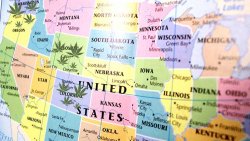
In recent years, four states and the District of Columbia have legalized the sale of retail marijuana by popular vote. 25 more states permit medical marijuana or have decriminalized marijuana possession. Starting as early as 2011, polls consistently showed Americans’ support of legalizing marijuana. A number of states are likely to consider legalization ballot initiatives or legislative measures over the next few years, asserts speeding ticket lawyer Zev Goldstein. Many Marijuana legalization states will benefit hugely from these measures—and other states stand to learn a great deal from these decisions.
Marijuana Legalization States
Washington State
In just one year of legalization, marijuana sales generated $70 million in tax revenue, reports Huffington Post. This is well above initial estimates for what Washington would be able to bring in. Other states stand to benefit even more, drawing in billions of dollars of tax revenue simply through marijuana sales. Officials in Washington have noted that the difference between medical and recreational marijuana legislation is considerable; they wish that the issues had been tackled at the same time, creating similar tax rates and regulatory structure as part of the initial move toward recreational legalization. Other states stand to learn a great deal from this approach.
Colorado
In Colorado, recreational pot sales have brought in $53 million in tax revenue, according to CNN Money. After realizing that the current tax rate, approximately 30 percent, hasn’t been adequate to reduce black market marijuana sales, Colorado is considering a proposal to drop that rate. This method might create a minor reduction in tax revenue, but it will also move more sales from the black market to the legal shops, ensuring higher sales and, over time, imposing better regulations on marijuana across the state.
Oregon
Oregon collected $3.48 million in taxes from recreational marijuana sales in January, says Noelle Crombie of OregonLive, selling at least $14 million worth of recreational marijuana in January alone. That figure far outpacing estimates and doesn’t take into account medical marijuana sales, which remain untaxed. Furthermore, the state announced that it has collected $6.84 million in taxes from sales of recreational pot in January and February combined. They’ve sold an estimated $27 million worth of recreational marijuana since the start of 2016.
Marijuana Legalization States – How Much Does Your State Stand to Gain?
According to most estimates, legalizing marijuana sales across the United States could lead to gargantuan increases in tax revenue for marijuana sales. This money could be put to good use in many states. Some, of course, stand to gain more than others. Here’s what a NerdWallet study found:
California, for example, stands to gain more than $500 million. Florida could quickly bring in over $100 million. States with smaller populations, like Rhode Island, might bring in around $20 million. Southern states, with a higher stigma against recreational marijuana use, might also see lower, yet still substantial, tax revenue: West Virginia stands to pull in around $11 million in tax revenue, while Mississippi stands to make an estimated $21 million. While the tax revenue might vary by state, it’s certain that every state stands to benefit substantially from marijuana legalization.
Nationwide Legalization
Marijuana legalization has faced a great deal of opposition in several states. Other Marijuana legalization states, however, have wholeheartedly embraced a shift toward legal use of this popular recreational drug. Nationwide legalization of marijuana could stand to bring in as much as $28 billion of additional tax revenue each year, according to Vox. By the numbers alone, this is a staggering proposal that could potentially allow the nation to gain a great deal, creating a budget pool to help fund schools, fix roads, and cover other necessary expenses within the state. In fact, most estimates suggest that current projections concerning tax revenue from marijuana may be relatively low, as it takes time for stores to establish themselves and build up an adequate stock to meet the demand. By taking lessons from Colorado, Washington, and other states that have legalized marijuana use, many other states can expect to see the same types of monetary gains.
Within the next five years, it’s predicted that at least 18 states across the United States will have legalized recreational marijuana becoming Marijuana legalization states. This is a huge increase from the four states that currently have or are in the process of creating legal recreational use of marijuana—and it has the potential to create incredible financial gains for those states. Over the next several years, it’s likely that a number of factors will unfold, showing everyone across the nation who the real winners are when it comes to legalization of a recreational substance already in heavy use across many states.






